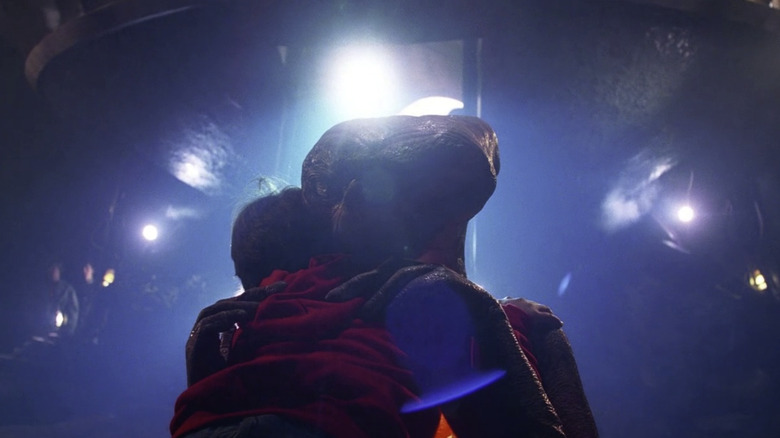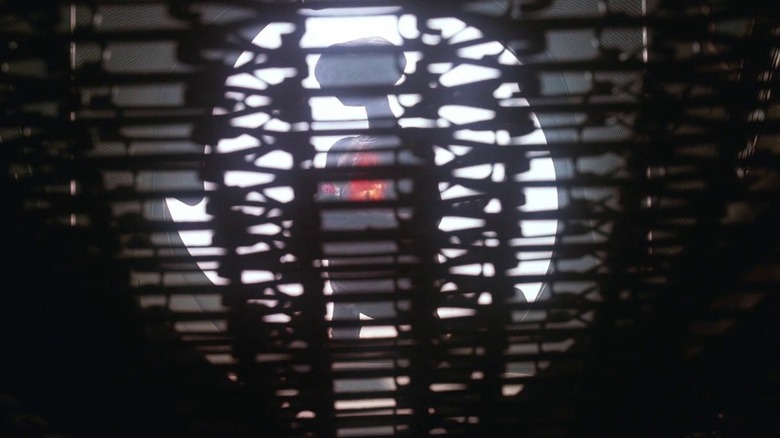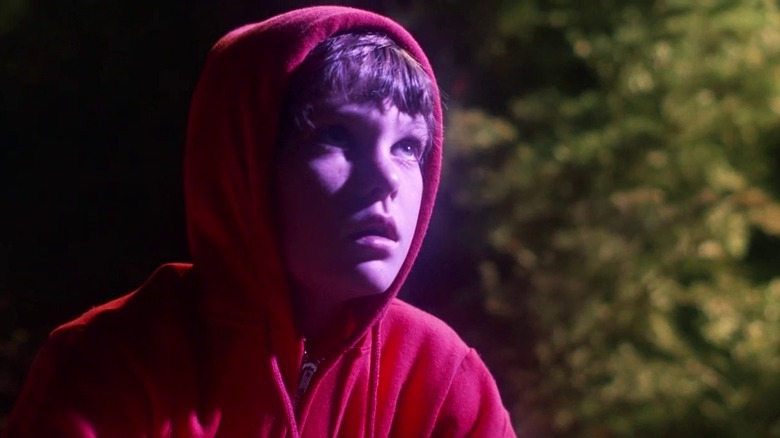Filming Close Encounters' Climactic Scene Inspired Steven Spielberg To Put A Divorce Theme In E.T.
The master of the modern blockbuster, Steven Spielberg may be known for capturing spectacle — but he's just as skilled at capturing the human experience. The director's true defining quality is his ability to infuse his films with the achingly personal details of his own life, bottled up as universal themes. His latest film, "The Fabelmans," is not just a semi-autobiographical family drama, but also a perfect excuse to revisit the rest of Spielberg's filmography with fresh eyes. The movie's depiction of his childhood reveals a central tension underlying many of Spielberg's most beloved films. Essentially, this is the story that the filmmaker had been telling for decades — just without his usual comforts of allegory and genre twists.
Take "E.T. the Extra-Terrestrial," a film about a friendly alien befriending some kid. It may not be immediately clear to all viewers that the story is centered on a divorce-torn family, but the sadness behind Elliott's (Henry Thomas) eyes and Dee Wallace's delivery of "He hates Mexico" are telling for those in the know. The film's subtext has only grown more apparent with time.
Earlier this year, Steven Spielberg attended a 40th anniversary screening of "E.T." at the TCM Classic Film Festival, and explained how his childhood experiences informed the film, and also how filming a climactic scene helped put the rest of the movie into perspective for him.
Spielberg's life experiences find their way into his films
Spielberg's three blockbuster movies about aliens represent a trilogy of extra-terrestrial beings impacting domestic lives. His first, and most cynical entry, "Close Encounters" depicts a man departing from his family in an obsessive pursuit of scientific knowledge. The closing chapter, Spielberg's take on "War of the Worlds" would come out after the director himself became a father, and would depict Tom Cruise as a father keeping his family together despite all odds.
"The Fabelmans" wouldn't see the light of day until this year, but Spielberg has been sitting on telling his family's story through film since the late 1970s. "What happened was, I had been working on an actual literal script about my parents' separation and divorce," Spielberg told TCM's Ben Mankiewicz. (Variety describes this script as an "un-fantastical film idea [that] would have reflected his and his sisters' experience with their parents splitting.") The filmmaker admits that the idea of torn families was on his mind during the production of "Close Encounters of the Third Kind."
"I was shooting the [climactic] scene and I suddenly thought, 'Wait a second. What if that little creature never went back to the ship? What if the creature was part of a foreign exchange program? [Richard] Dreyfuss goes and he stays? Or she stays?'"
Reflecting back, Spielberg observes that ideas he was trying to explore in his auto-biographical feature made their way into early concepts for "E.T."
Cinema has the power to reveal truth
As the middle chapter in Spielberg's alien trilogy, "E.T." is possibly the most personal, shifting its perspective away from the parental figures in the story and coloring in the drama directly from its child protagonists. Thus, his family drama became:
"... a story about children and a family trying to fill a great need ... Divorce creates great responsibility. If you have siblings, we all take care of each other [in the wake of divorce]. And what if Elliott, or the kid — I hadn't quite dreamed up his name yet — for the first time in his life becomes responsible for a life form, to fill the gap in his heart?"
When it comes to Spielberg, he's a very instinctual filmmaker. In "The Fabelmans," he openly shows his surrogate character, Sammy (Gabriel LaBelle) inadvertently putting himself into his stories, whether he's aware of it or not. In a famous interview with James Lipton, Spielberg realized in the moment that "Close Encounters" was evocative of the conflict between his mother and father.
That's one of the most beautiful things about cinema. No matter what kind of fancy special effects and tricks we can use to distort reality, there's always some sort of inner truth in the frame to be revealed.


